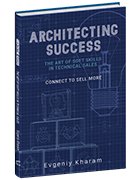Technical sales rise when you tap into soft skills
Evgeniy Kharam published a book exploring soft skills in technical sales to improve sales success and minimize turnover. In this Q&A, you'll find key takeaways from the book.
Gone are the days of the "always be closing" mentality. Today, closing deals and winning over customers require much more than smooth talk and creating FOMO. In B2B tech, sales reps must be well versed in technology, experts in the problems their clients are trying to solve and, most importantly, trustworthy. With more options on the market than ever before, technical sales professionals need to bring their A game to secure the deal. It's all about building relationships and clearly demonstrating value. Like parenthood, it takes a village -- and a diverse set of skills.
This village may include sales engineers, sales reps, technical experts and other people. The skills evolve over time, as every client and scenario is different, but the keys to unlocking sales success lie in being open to learning and embracing nontechnical skills.
Evgeniy Kharam is a seasoned cybersecurity architect, advisor and podcaster and just published his new book, Architecting Success: The Art of Soft Skills in Technical Sales: Connect to Sell More, where he provides insights on how mentoring, problem-solving, listening and empathy can better align technical and sales teams.
I recently sat down with Kharam to learn more about the book, and here you'll find some highlights from our conversation. As you read, you'll notice a book icon that you can click on for additional information about the book. Also, here is a downloadable chapter sample for you to explore.
What inspired you to write this book at this stage in your career? Is there a problem you've seen in the tech industry that your book is intended to help solve?
Evgeniy Kharam: A few things to note: First, I observed how people's focus decreased on video calls, and it's very challenging to have people focus on what you are trying to present to them. We lost the dedicated time we had in physical meetings, where people were with you and not distracted by several screens, leaving you unsure if they are listening or just scrolling on another screen.
Second, people consume information differently; some like to listen, some prefer to watch and others like to physically interact with the technology. We need a better way to connect with people.
Lastly, there are many small pieces needed to excel in what you do, like a 3D puzzle. We have many skills that make us great. This could be the way we speak, the way we set up our background, the quality of our sound and video, whether we mumble or use filler words, whether we know when to stop and listen to the customer, and whether we know which hooks we can use to connect with people. All of this makes us better, smarter, stronger.
The combination of all this is the book.
How did you develop the key concepts in the book?
Kharam: The initial idea was to show the changes and the transformation that happened in sales engineers and how sales engineers became more sales-oriented and how they can now impact the outcome much more. But, while writing the book, I saw that it is applicable to both sales and technical sales, and I slowly realized that I am writing about the transformation that happened to me and the steps I took to make myself better. I also took a lot from the hundreds of vendor pitches I saw and the problems I observed there. Lastly, I interviewed friends with whom I had worked for years and took some of their lessons as well.
You mention that the book 'highlights how mentoring, problem-solving, listening and empathy can bridge the divide between technical teams and sales, fostering collaboration and reducing attrition.' How do you think the pandemic has affected the relationship between technical and sales teams?
Kharam: The pandemic was one of the drivers for the book. We have less time to make an impact, so we need to do our research better. We must always elevate our game to ensure we are relevant to the customer. With the increase in the number of calls we now have, we need to learn how to be present and avoid burnout.
What do you hope technical teams will learn about sales teams from this book, and vice versa?
Kharam: How to work together, where they can reverse roles and help each other, how to understand the customers better and present information in the way the customer wants to see it. How to focus on customer needs rather than showing how great their demo or PowerPoint is.
While this book focuses on sales, are there insights that can be valuable for professionals outside of technical and sales roles?
Kharam: I think at least 60% of the book is applicable to anyone. Also, if you think about it, we are all selling all the time: who will do the dishes, what movie we will watch, which restaurant to go to. In a way, there is a lot in common. While a big portion of the book focuses on technology sales via video platforms, there are chapters that focus on team collaboration, when to use open-ended questions and when to use closed-ended questions, how to improve your voice, how to overcome fear, how to deal with burnout and how to be present to do your work. Furthermore, many times in our career, we need to sell an idea or present a new project and much more. There are many techniques in the book that can help people achieve this.
Natasha Carter is director of partnerships and event content at TechTarget.









